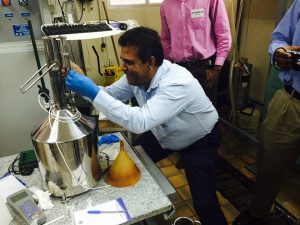
Metrology is the science of measurement and is divided into three fields:
• scientific or fundamental metrology;
• applied or industrial metrology; and
• legal metrology.
Scientific Metrology
Scientific (or Fundamental or General) metrology deals with the organisation and development of measurement standards (SI Units) and with their maintenance. There are different specialist areas, e.g. Mass metrology, Volume metrology, Temperature metrology and Chemical Metrology. It signifies the highest level of accuracy within the given area (mass, volume, etc.) and is supplemented by legal and industrial metrology.
Industrial Metrology
Industrial metrology concerns the application of measurement science to manufacturing and other processes and their use in society, ensuring the suitability of measurement instruments, their calibration and quality control of measurements.
Legal Metrology
Legal metrology concerns regulatory requirements of measurements and measuring instruments for the protection of health, public safety, the environment and consumers, for enabling taxation, and for fair trade.
The importance of metrology to society
Measurements have been carried out for as long as civilization has existed. Metrology is basic to the economic and social development of a country. It is concerned with providing accurate measurements which impact our economy, health, safety and general well-being.
We measure practically everything: the weight of our food, the volume of our fuel, the distance between two points, the temperature of the room, the noise at the workplace etc. Incorrect measurements lead to wrong decisions, which can have serious consequences.
The Bureau International des Poids et Mesures (BIPM) defines metrology as “the science of measurement, embracing both experimental and theoretical determinations at any level of uncertainty in any field of science and technology”.
Without metrology, life would be very difficult. Imagine the following:
- filling up your vehicle at the gas station and not knowing if you are getting the amount of gas that you are being charged for;
- buying produce in the marketplace and being unsure if the scale is measuring accurately;
- shipping for export and being uncertain whether your shipment will weigh the same when it reaches the importing country;
- administering a lifesaving medication and being unsure of the dosage.
The role of standards in metrology
In measurement science, the word ‘standard’ is used with two different meanings:
- a widely adopted specification, technical recommendation or similar document; and
- a measurement reference.
Measurement standards can be a physical measure, measuring instrument, reference material or measuring system intended to define, realize, conserve or reproduce a unit or one or more values of a quantity to serve as a reference. For example, the unit of the quantity ‘mass’ is given its physical form by a cylindrical piece of metal of one kilogram, which represents the international standard, and the unit of quantity ‘length’ is given in physical form by a series of gauge blocks to represent certain values.
Traceability
Traceability is defined as a measurement whereby the result can be related to a reference through an unbroken chain of calibrations.
The level of traceability establishes the level of comparability of the measurement: whether the result of a measurement can be compared to the previous one, a measurement result a year ago, or to the result of a measurement performed anywhere else in the world.
Calibration
Calibration establishes the relation between the indication of a measuring instrument and the value of a measurement standard.
Regional Metrology
A recently developed concept is that of regional Caribbean Reference Laboratories (CARLs), which will provide efficient and cost-effective traceability to primary quantities at the international level for working standards at the national level.
Quantities to be developed include mass, volume, temperature, time and frequency. In 2013, the Bureau of Standards Jamaica (BSJ) was recognised as the first regional CARL in the area of mass metrology, and by 2016, the Trinidad and Tobago Bureau of Standards (TTBS) followed, being recognised by the Council of CROSQ as a CARL in temperature, while the BSJ also was recognized as a CARL for volume. The progress towards the development and recognition of additional NMIs as regional CARLs is continuing, while those already established continue to develop their scope and range of capability.
CROSQ’s role in regional metrology development
CARIMET is the regional arm of the Sistema Interamericana de Metrología (SIM), which is made up of representatives of the National Metrology Institutions (NMIs) of all the States of the Caribbean area, with the exception of Cuba and Puerto Rico. Its core members are the English-speaking countries of CARICOM, including Guyana and Suriname. Belize is geographically associated with another sub-regional group (CAMET), but it is a general practice within SIM to group Belize with CARIMET. CARIMET became a Technical Committee of CROSQ in 2008.
